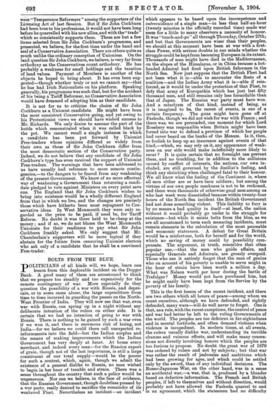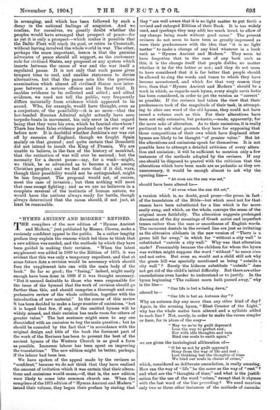P OLITICIANS of all kinds will, we hope, learn one lesson
from this deplorable incident on the Dogger Bank. A good many of them are accustomed to think that we prepare too steadily and too expensively for the remote contingency of war. More especially do they question the possibility of a war with Russia, and depre- cate, or in some cases abuse, the large expenditure from time to time incurred in guarding the passes on the North- West Frontier of India. They will now see that war, even war with Russia, can spring up in a night without any deliberate intention of the rulers on either side. It is certain that we had no intention of going to war with Russia. There is nothing to be gained by such a war even if we won it, and there is enormous risk of losing, not India—for we believe we could there call unexpected re- inforcements into the field—but the Indian surplus and the means of making improvements which the Indian Government has very deeply at heart. At home every merchant, and indeed every man—for the Russian export of grain, though not of the last importance, is still a large constituent of our total supply—would be the poorer for such a contest, which, again, though we admit the existence of a general dislike to Russia, no man wished to begin in her hour of trouble and strain. There was a sense throughout the country that such a policy would be ungenerous. Nor can we believe, in the face of evidence, that the Russian Government, though doubtless pressed by a war party, really desired to sacrifice the remainder of its weakened Fleet. Nevertheless an incident—an incident which appears to be based upon the incompetence and outrecui dance of a single man—in less than half-an-hour (twenty minutes is the officially recorded time) made war seem for a little to many observers a necessity of honour. It was "touch-and-go" all through Thursday, October 27th; and but that Governments are wiser than their peoples, we should at this moment have been at war with a first- class Power, with serious doubts in our minds whether the struggle could be kept from becoming European in its extent. Thousands of men might have died in the Mediterranean, on the slopes of the Himalayas, or in China because a hot- headed Admiral had fired upon British fishermen in the North Sea. Now just suppose that the British Fleet had not been what it is—able to encounter the fleets of a coalition—and the Indian Army what it is—able if rein- forced, as it would be under the protection of that Fleet, to defy that army of Kuropatkin which has just lost fifty thousand men, and still remains only less formidable than that of Japan. The Russian war party must have won. And a cataclysm of that kind, instead of being, as it is imagined to be, the rarest of events, is one of a certain frequency. The guns might have gone off at Fashoda, though we did not wish for war with France ; and there was, we are persuaded, one moment for which Lord Rosebery was responsible when Britain might have been forced into war to defend a province of which her people had never heard on the banks of the Menam. Is it, then, so foolish to keep up an insurance against events of that kind,—which, we may rely on it, any appearance of weak- ness on our side would make indefinitely more likely to recur ? It is quite certain that no foresight can prevent them, and no truckling, for in addition to the collisions caused by conflict of interests, the nations, our own in- cluded, are still governed by the duellist's feeling, and think any shrinking when challenged fatal to their honour. We all know what the feeling of the Continent is, where all men either are or have been soldiers ; but among the virtues of our own people meekness is not to be reckoned, and there were thousands of otherwise goad men among us who last week were dissatisfied because within twenty-four hours of the North Sea incident the British Government had not done something violent. This liability to fury is by no means a bad quality in itself—at least, the nation without it would probably go under in the struggle for existence—but while it exists bolts from the blue, as we are all accustomed to term such menacing incidents, must remain elements in the calculation of the most peaceable and economic statesmen. A defeat for Great Britain would be a misfortune, both for herself and for the world, which no saving of money could by possibility com- pensate. The argument, in truth, resembles that often popular one,—that the men who guide affairs, and especially Generals and Admirals, are grossly overpaid. Those who use it entirely forget that the man of genius who on account of his poverty is unable to serve might in the hour of strain have been worth a million a day. What was Nelson worth per hour during the battle of Trafalgar ? Money would not have purchased him, but he might easily have been kept from the Service by the poverty of his family.
This is the first lesson of the recent incident, and there are two others which all lovers of peace—among whom we count ourselves, although we have defended, and rightly defended, many wars—will do well never to forget. One is that, as a rule, with the rarest exceptions, the control of peace and war had better be left to the ruling Governments of the world. The peoples are too deficient in far-sightedness and in mental fortitude, and often demand violence when violence is inexpedient. In modern times, at all events, the rulers usually dislike war, understanding its terrible chances and ruinous effects, and will make many conces- sions not directly involving honour which the peoples are too furious to propose. No doubt the great war of 1870 was ordered by rulers and not by subjects ; but that war was rather the result of jealousies and ambitions which had been growing for ages, and which could be settled only by the sword, than of any individual decisions. The Russo-Japanese War, on the other hand, was in a sense an accidental war,—a war, that is, produced by a blunder based on defective information. The French and British peoples, if left to themselves and without direction, would probably not have allowed the Fashoda quarrel to end in an agreement, which the statesmen had no difficulty in arranging, and which has been followed by such a decay in the national feelings of suspicion. And we confess, for ourselves, we greatly doubt whether the peoples would have arranged that prospect of peace—for as yet it is only a prospect—which makes it possible that the Baltic Fleet will reach its goal, or retire to Cronstadt, without having involved the whole world in war. The other, perhaps the more important, lesson is that the genuine advocates of peace should all support, as the customary rule for civilised States, any proposal or any system which inserts between the cause of war and the war itself a regulated pause. It is not only that such pause gives tempers time to cool, and enables statesmen to devise alternatives, but that the pause acts like the previous examination which almost all civilised States now inter- pose between a serious offence and its final trial. It enables evidence to be collected and sifted ; and sifted evidence, we need not tell the public, very frequently differs materially from evidence which appeared to be sound. Who, for example, would have thought, even as a conjecture, of the possibility—it is no more—that the hot-beaded Russian Admiral might actually have seen torpedo-boats in movement, his only error in that regard being that they were his own, which he fancied elsewhere? There has been false evidence produced on the eve of war before now. It is doubtful whether Jenkins's ear was cut off by enemies of England, though we fought Spain mainly on that -ground ; and quite certain that Benedetti did not intend to insult the King of Prussia. We are unable to believe, in the face of the history of mankind, that the extinction of war will ever be secured ; but the necessity for a decent pause—say, for a week—might, we think, be so advocated as to become a law among Christian peoples ; and we feel sure that if it did, wars, though their possibility would not be extinguished, might be less frequent. The proposal would not, of course, meet the case of invasion ; but then nothing will meet that case except fighting ; and as we are no believers in a complete reversal of the instincts of human nature, we would have the nations always ready for battle, though always determined that the cause should, if not just, at least be reasonable.
"HYMNS ANCIENT AND MODERN" REVISED.



























































 Previous page
Previous page